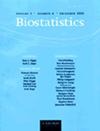非随机缺失混杂因素的因果效应识别和估计。
IF 2
3区 数学
Q3 MATHEMATICAL & COMPUTATIONAL BIOLOGY
引用次数: 0
摘要
当混杂因素不是随机缺失时,从观察性研究中做出因果推断可能是具有挑战性的。在这种情况下,往往不能保证确定因果关系。在一个真实例子的激励下,我们考虑了一个与治疗无关的缺失假设,在这个假设下,我们建立了混杂因素非随机缺失时因果效应的识别。我们提出了一种加权估计方程方法来估计模型参数,并引入了三种基于回归、倾向得分加权和双重稳健估计的平均因果效应估计器。我们通过模拟来评估这些估计器的性能,并提供一个真实的数据分析来说明我们提出的方法。本文章由计算机程序翻译,如有差异,请以英文原文为准。
Identification and estimation of causal effects with confounders missing not at random.
Making causal inferences from observational studies can be challenging when confounders are missing not at random. In such cases, identifying causal effects is often not guaranteed. Motivated by a real example, we consider a treatment-independent missingness assumption under which we establish the identification of causal effects when confounders are missing not at random. We propose a weighted estimating equation approach for estimating model parameters and introduce three estimators for the average causal effect, based on regression, propensity score weighting, and doubly robust estimation. We evaluate the performance of these estimators through simulations, and provide a real data analysis to illustrate our proposed method.
求助全文
通过发布文献求助,成功后即可免费获取论文全文。
去求助
来源期刊

Biostatistics
生物-数学与计算生物学
CiteScore
5.10
自引率
4.80%
发文量
45
审稿时长
6-12 weeks
期刊介绍:
Among the important scientific developments of the 20th century is the explosive growth in statistical reasoning and methods for application to studies of human health. Examples include developments in likelihood methods for inference, epidemiologic statistics, clinical trials, survival analysis, and statistical genetics. Substantive problems in public health and biomedical research have fueled the development of statistical methods, which in turn have improved our ability to draw valid inferences from data. The objective of Biostatistics is to advance statistical science and its application to problems of human health and disease, with the ultimate goal of advancing the public''s health.
 求助内容:
求助内容: 应助结果提醒方式:
应助结果提醒方式:


